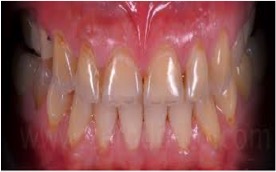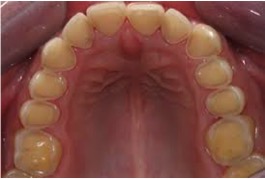 Dental erosion is the acidic chemical wear/loss of the tooth enamel (the white hard protective outer layer).
Dental erosion is the acidic chemical wear/loss of the tooth enamel (the white hard protective outer layer).
Causes of Erosion
Acid present in the mouth causes erosion. There are two ways in which this can occur the most common is extrinsic acids. Extrinsic acids come from your diet, medications, and industrial/work exposure. The other way that erosion can happen is from an intrinsic factor, which is gastric reflux bringing the stomach acids into the mouth.
With either or both of the acid exposures in the mouth, if regularly occurring the acids weaken and dissolve the tooth, creating many problems to your mouth and health.
How to Prevent Erosion
It is normally quite simple and easy to prevent erosion. First the type of cause needs to be determined (extrinsic or intrinsic) then changes to lifestyle can be implemented accordingly. At Vision Dental we diagnose and help you manage dental erosion. Some examples include:
Extrinsic Factors
Dietary: Reduce the intake of acidic foods or beverages such as citrus fruits, fruit juices, carbonated beverages, vinegar and pickles, carbonated drinks, energy and sports drinks, cordial, some alcohols, and some bottled waters.
- Medications: Reduce the intake or exposure to chewable vitamin tablets, aspirin, some cough syrups, and some antiseptic mouth rises.
- Occupational/ work: Wine tasters, working in battery workshops and exposure to improperly chlorinated pools/spas are examples of working exposures.
- Reduced saliva and a dry mouth can exacerbate erosion, so ensure you are hydrated with fluoridated water and chew sugar fee gum to produce saliva
- Drink acidic beverages from a straw and rinse your mouth afterwards with water.
- Consume acidic foods/drinks with meals and not as snacks to reduce exposure to acid.
- Eat foods that are basic and have calcium such as cheese and milk after eating acids to neutralise/cancel the acids in the mouth.
Intrinsic Factors
- This includes vomiting and reflux due to medical conditions. The above points can help reduce further acid exposure and manage exposures.
- After vomiting rinse mouth out with tap water
- Do not brush your teeth after vomiting, wait at least 1hr before brushing. This also applies to after consuming acidic foods/beverages.
- If your teeth ache or are sensitive from acid exposure, smear a small amount of fluoridated tooth paste or tooth mousse on the affected areas and leave it there. This helps re-mineralise and strengthen teeth
What Happens If Left Untreated?
 If erosion is left undiagnosed and or untreated many dental and health problems can occur. First of all the aesthetics and functionality of your teeth can be compromised. The teeth become yellow, brittle, and bitting surfaces/edges are smoothed. This makes your teeth weak, prone to breaking, and ultimately stops their function of mastication (eating). As a result you are not able to chew properly and have a restricted diet affecting your overall health.
If erosion is left undiagnosed and or untreated many dental and health problems can occur. First of all the aesthetics and functionality of your teeth can be compromised. The teeth become yellow, brittle, and bitting surfaces/edges are smoothed. This makes your teeth weak, prone to breaking, and ultimately stops their function of mastication (eating). As a result you are not able to chew properly and have a restricted diet affecting your overall health.
As the teeth are weak tooth decay (caries) is likely to occur and the extent of decay tends to be more severe leading to potential abscesses and RCT’s. Sensitive teeth are also another outcome of untreated erosion. Your teeth become more porous and as a result are more prone to staining. It is important to detect and treat erosion early before the above mentioned complications occur. Regular dental checkups and the relevant treatment to maintain your teeth will help you correctly address and maintain your erosion and other dental problems.
For more information or to book a consultation contact Vision Dental on (02) 9543 4222.
